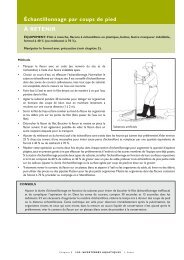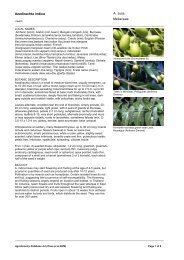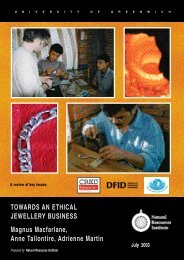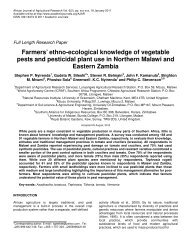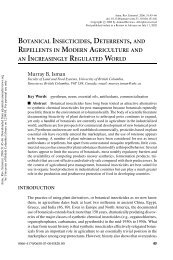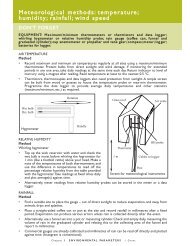African Water Laws - Natural Resources Institute
African Water Laws - Natural Resources Institute
African Water Laws - Natural Resources Institute
You also want an ePaper? Increase the reach of your titles
YUMPU automatically turns print PDFs into web optimized ePapers that Google loves.
JUMA & MAGANGA<br />
The response by the Pangani Basin <strong>Water</strong> Office and the government illustrate how application of mainstream<br />
laws may facilitate equitable conflict management in communities with multiplicity of customary systems. This<br />
intervention helped to avert a possible conflict between the Taiko clan and the rest of the villagers in Landanai.<br />
Box 2. Ndung’u Irrigation Project vs Pare customary law<br />
The village of Ndung’u is situated in the local government Ward of Ndung’u of Same Distric in Pangani Basin. The village is part of<br />
the Same District Council. It is a traditional village of the Wapare people, although there are also other tribes like the Sambaa, and<br />
Maasai pastoralists. The village enjoys year round irrigation water from a number of rivers and streams which is used by around<br />
2000 villagers. Paddy is grown twice a year. .<br />
Traditionally, land in Ndung’u was owned under customary arrangements, including in the areas covered by the irrigation project.<br />
There are several cases of customary owners leasing their irrigated blocks to others. Conflicts over land between owners and<br />
outsiders were almost non-existent because ownership was in accordance with customary arrangements which were well<br />
established and respected. Conflicts over land were restricted to relatives competing over inherited parcels or tenants failing to<br />
comply with applicable agreements. These conflicts were referred to traditional bodies known as kitala.<br />
Following the penetration of statutory laws, projects and other institutions, land disputes are now referred to the irrigation project<br />
leadership. If the project leadership fails to resolve an issue, the dispute is taken before the Baraza la Ardhi la Kijiji (the Village Land<br />
Tribunal). A new hybrid of the customary system with a strong dose of mainstream values is in place. This hybrid came in the form of<br />
the subsidiary legislation made by the Same District Council under Local Government (District Authorities) Act, 1982to regulate<br />
irrigation agriculture in Ndungu area of Same district (Same District Council, 1994) The by-laws cover the Mkomazi river valley area<br />
of Ndungu designated as a project area for purposes of agricultural development. Mkomazi river is a controlled water source under<br />
the <strong>Water</strong> Utilisation (Control and Regulation) Act, 1974.<br />
Ndung’u Irrigation project extracts water from Mkomazi river under a water right issued by the Pangani River Basin. The project has<br />
taken over the control over a number of facilities that were constructed over land and water sources occupied and used under<br />
customary law of the Wapare people. Existing land and water tenure system were as a result of the project divided into blocks<br />
forming (i) main and secondary drains from Mkomazi river and their related structures; (ii) main and secondary irrigation canals,<br />
intake weir, water gates and other related structures; (iii) tertiary irrigation canals and drains; (iv) flood dikes, gates and other<br />
installations for prevention of flood, (v) water course and their related structures, and (vi) trunk road, main and secondary farm road,<br />
warehouse, residential quarters and any utility designated for residential or infrastructural purposes. The irrigation project also spelt<br />
the end of traditional water and land management systems. The district council established a project office responsible for the<br />
running and maintenance of the irrigation project. It must be observed that the project retained to certain extent traditional system,<br />
because each irrigation block elects its own leaders and committees, and these leaders are mostly drawn from those families, which<br />
in the past exercised control over water and land management.<br />
There is in place also an Executive Committee of the project assisting the Council. This Committee is composed of District (i)<br />
Commissioner or his representative; (ii) District Director or his representative; (iii) Chairman of the Same District Council; (iv)<br />
Chairman to the standing committee on economic affairs of the Same District Council; (v) two councillors from the project area; (vi)<br />
two prominent farmers nominated by project beneficiaries (defined to mean any person or community holding any agricultural land<br />
within the project area). Functions of the executive committee have obviously taken over those which customary organs would<br />
exercise. The committee enjoys overall oversight of the project. It discusses, reviews and approves- (i) past performance of the<br />
project office and the water user’s group operating in tertiary blocks; (ii) annual programmes for the operation and maintenance of the<br />
project; (ii) expenditures and budget, on the running of the project office. Other activities of the Committee include approval of the<br />
appointment of the project Manager, and determination of the amount of water charges to be imposed on the project beneficiaries.<br />
Project beneficiaries have formed two <strong>Water</strong> Users’s assemblies for the Ndungu and Misufini areas. Each of the two assemblies<br />
elects a chairman, a secretary and an accountant. Assemblies meet at least once every year to discuss irrigation plans and methods.<br />
The assemblies also meet to supervise, direct or otherwise coordinate activities of <strong>Water</strong> Users’ Groups. Assemblies designate<br />
methods of imposition and collection of water charges. <strong>Water</strong> Users’ Groups, operating at the level of tertiary blocks execute orders<br />
and instructions flowing from project office. These groups are described as terminal organs of the project office. The groups are<br />
ultimately required to ensure proper operation and maintenance of the terminal project facilities. These groups decide on the water<br />
distribution plan within their respective tertiary blocks. <strong>Water</strong> Users’ Groups settle disputes arising among members of the group and<br />
take care of water distribution within tertiary blocks.<br />
There is no doubt that implementation of the irrigation project as illustrated in Box 2 has completely changed<br />
the pre-existing customary tenures in Ndung’u. The limited space for the application of customary water and<br />
land laws is closely related to the increasing power of the District Council. The Council is vested with a lot of<br />
power over the organization and administration of the project office. The day-to-day activities of the project<br />
office are under a Project Manager who remains answerable to the Council.<br />
Despite delegation of powers to the level of <strong>Water</strong> Users’ Assemblies and <strong>Water</strong> Users’ Groups, project<br />
beneficiaries are subject to control from both the District Council and the project office. The project office may<br />
for instance change or vary the irrigation schedules according to weather conditions. The district council may<br />
impose water charges upon beneficiaries in consideration for the use of project facilities and irrigation water.<br />
Project beneficiaries are not allowed to alter the form and nature of the agricultural land without written<br />
3-4



